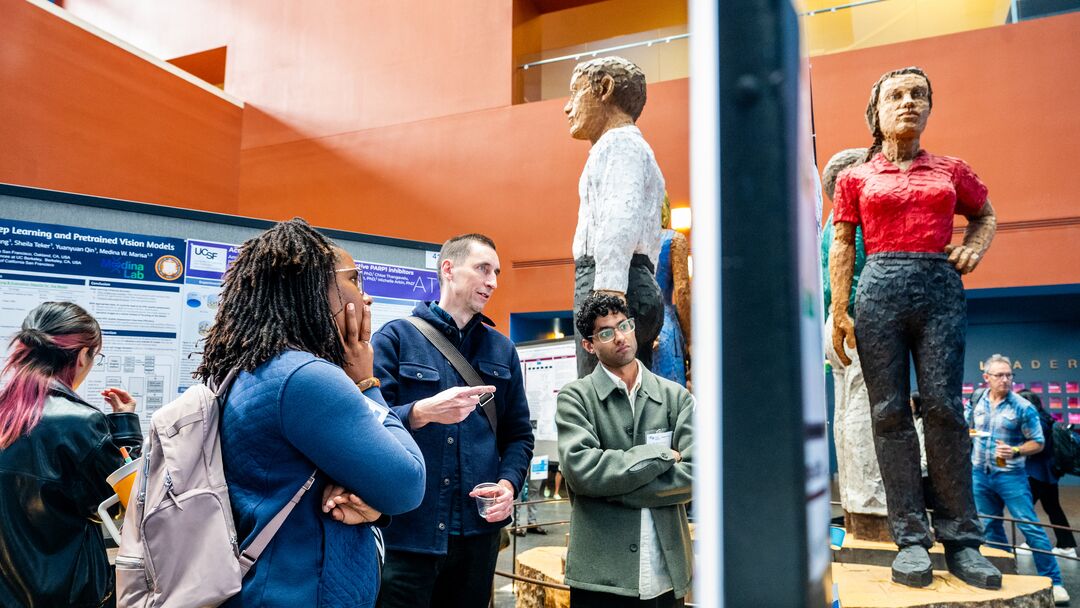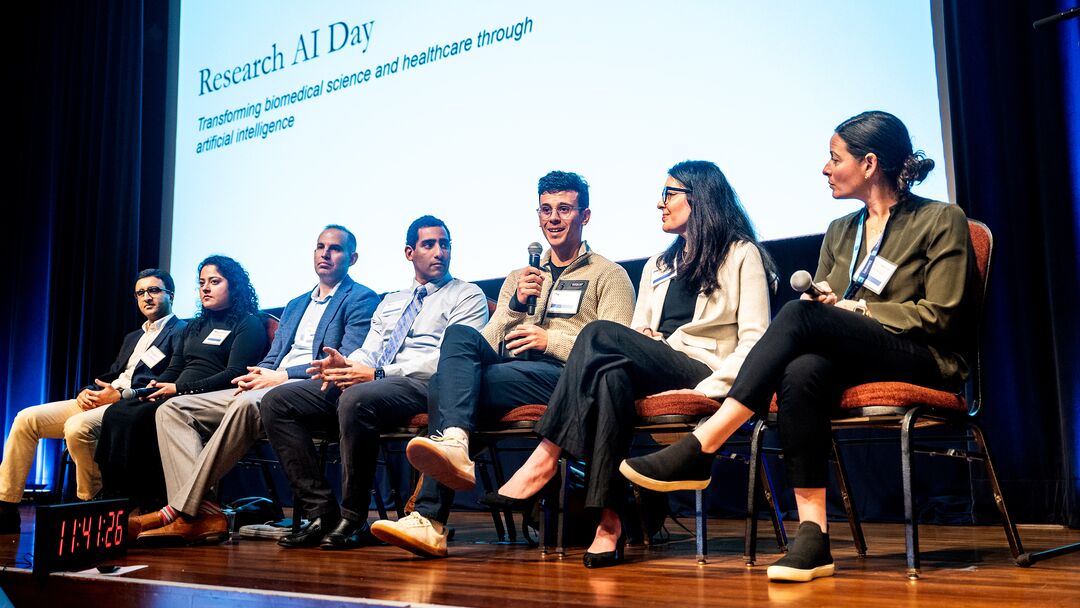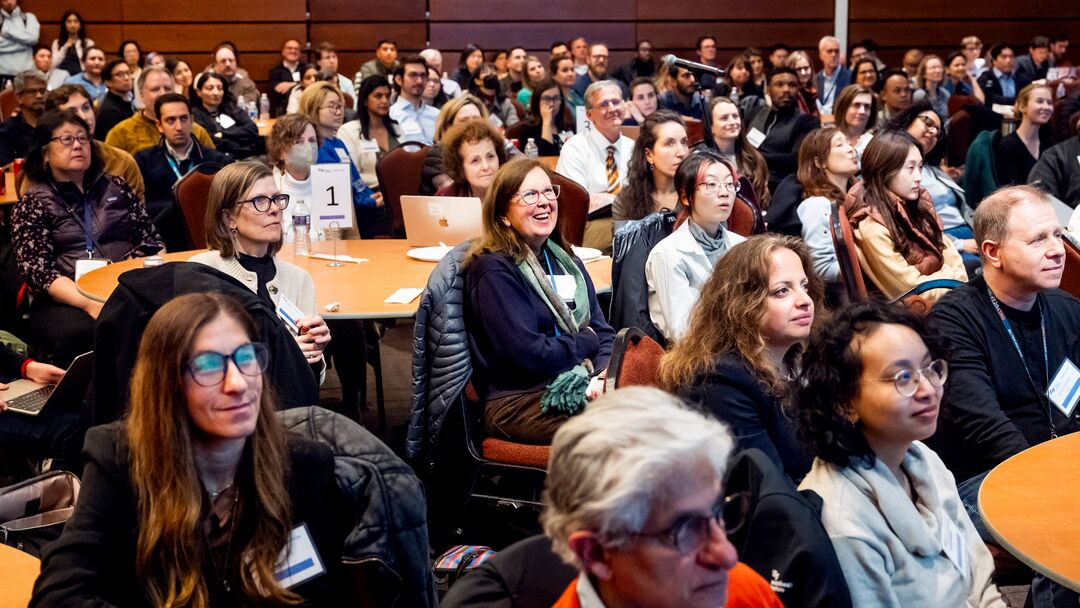UCSF Advances AI in Research Through Cross-Disciplinary Collaboration

UCSF Professor Tony Capra, PhD, center, examines a poster during Research AI Day at UCSF’s Mission Bay campus on Monday, March 17, 2025. (Photo by Noah Berger)
Collaboration is a driving force behind UCSF’s research mission – uniting experts across disciplines, institutions, and sectors to solve complex problems. This ethos is especially vital in artificial intelligence (AI), where responsible, effective innovation depends on deeply integrated approaches. So, it’s no surprise that cross-disciplinary collaboration took center stage at Research AI Day, a one-day event that showcased how UCSF researchers are using AI to advance discovery, clinical care, and population health.
Held on campus, the event drew hundreds of participants from diverse disciplines – psychiatry, radiology, neurology, basic science, and beyond – demonstrating how AI, also widely used in other UCSF mission areas, requires and benefits from a deeply integrative research approach.
The afternoon poster session spotlighted collaborations not just across UCSF departments, but with institutions like UC Berkeley, UC Irvine, Columbia University, the National Institutes of Health, and others around the world.
“Collaboration is the cornerstone of innovation in AI,” said Dr. Yulin Hswen, ScD, MPH, associate professor in the Department of Epidemiology and Biostatistics and leader of Research AI Day’s population health track. “AI's future depends not on siloed breakthroughs but on integrative approaches that bring together clinicians, epidemiologists, computer scientists, ethicists, and community advocates, among others.”
AI and Public Health: Detecting Inequities at Scale
UCSF’s leadership at the intersection of data science, public health, and clinical care is fueling new ways to tackle long-standing health disparities. Researchers are leveraging AI to reveal patterns of inequity—such as algorithmic bias and environmental exposures—that may otherwise go undetected.
Faculty such as Irene Chen, PhD, UC Berkeley and UCSF assistant professor of computational precision health, and Kim Rhoads, MD, MS, MPH, associate professor of epidemiology and biostatistics, are examining how social trends influence model performance and developing frameworks to mitigate bias in AI tools used in health care.
“At UCSF, we sit at the intersection of clinical expertise, public health leadership, and data science,” said Dr. Hswen, whose work exemplifies this type of collaboration through combination of social epidemiology, artificial intelligence, and data and behavioral science to predict public health patterns and transform data into actionable public health insights.
“AI is transforming population health by scaling our ability to detect and respond to patterns of inequity. Through computational modeling, we can uncover diseases that may be driven by hidden environmental exposures.”

AI in Clinical Practice: From Innovation to Implementation
As UCSF Health increasingly integrates AI into care delivery, researchers and health system leaders are working across specialties to design, evaluate, and scale new tools. These efforts span predictive models for missed appointments, perioperative planning, and clinical decision-making.
“Even implementing a single AI tool requires multiple skill sets and perspectives,” said Julia Adler-Milstein, PhD, professor of medicine. “We need expertise to study everything from model drift to user interface design to health outcomes.”
A key advancement is the launch of IMPACC—the Impact Monitoring Platform for AI in Clinical Care—developed in partnership with UCSF Health and the Division of Clinical Informatics and Digital Transformation (DoC-IT). IMPACC provides real-time monitoring of UCSF Health AI tools, supporting accountability for performance, safety, equity, and clinical impact.
AI and Scientific Discovery: Expanding the Boundaries of Biology
AI is also opening new frontiers in biological research, enabling scientists to make connections across scales—from atoms to populations—that were once out of reach.
“Biological systems operate across more than 10 orders of magnitude in time and space, yet research has historically been siloed by scale,” said Tony Capra, PhD, professor of epidemiology and biostatistics. “AI offers the opportunity to bridge those gaps.”
UCSF faculty like Jimmie Ye, PhD, Christina Theodoris, MD, PhD, and James Fraser, PhD, are applying AI to understand genetic variation and predict behavior in biological networks, using methods such as transfer learning to make more meaningful connections across datasets.

Building for the Future: Sustaining AI Momentum
To fully realize AI’s promise in research, clinical care, and education, UCSF leaders are focused on building the infrastructure and culture to support sustained, interdisciplinary innovation. That means fostering collaboration across departments, investing in faculty development, and creating communities of practice that bring together technologists, clinicians, and community leaders.
“AI won’t transform health on its own,” said Dr. Capra. “It must be guided by the deep expertise and engagement of UCSF’s people across all parts of our mission.”
As UCSF continues to integrate AI into its research enterprise, it does so with the understanding that breakthroughs happen not in isolation, but through collaboration—one of the institution’s greatest strengths.
